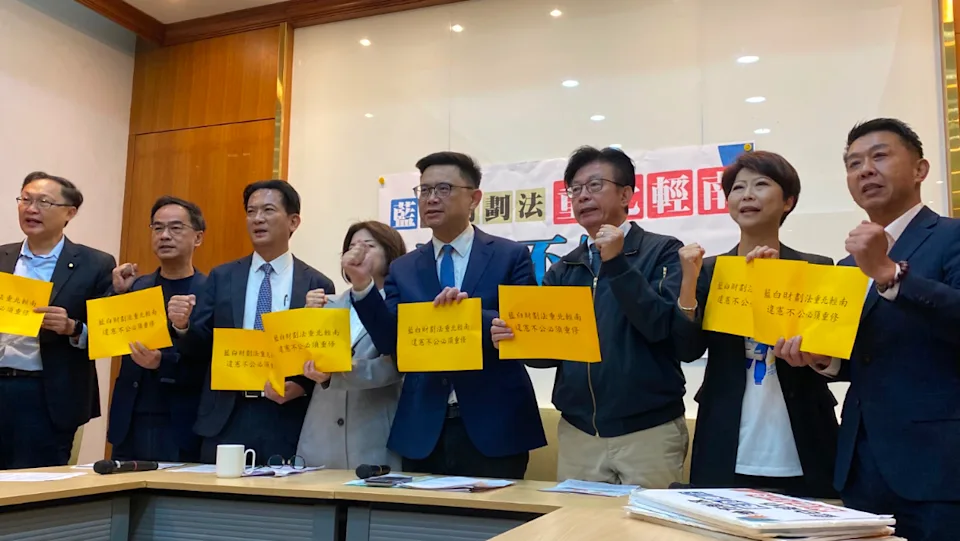By Eryk Michael Smith /Staff
Yahoo News image shows DPP lawmakers at Taipei press conference.
TAIPEI — Ruling party heavyweights from southern Taiwan closed ranks in Taipei on Wednesday, accusing the opposition of ramming through fiscal changes that “feed the north and starve the south,” and demanding the legislature reopen the books.
At a press conference led by legislator Lai Jui-lung (賴瑞隆), 11 Democratic Progressive Party lawmakers from Kaohsiung, Tainan, and Pingtung said the latest blue–white (KMT–TPP) revision of the Fiscal Revenue and Expenditure Allocation Act would hand Taipei City more than NT$40 billion, while leaving Kaohsiung more than NT$20 billion worse off in real terms. The KMT-TPP alliance rejects charges of being unfair to the south in amending the allocation laws (see below).
Lai called the changes “structurally unfair” and said any serious formula must factor in land area, aging populations, agriculture, and environmental burdens, not just existing revenue and political bargaining power. He also challenged opposition Kaohsiung mayoral hopeful Ko Chih-en (柯志恩) to explain why she backs a system that disadvantages the city she hopes to lead. Yahoo News reported Ko saying in October that the version of the law spearheaded by the KMT/blue-white side at that time was developed by academics and think tanks, and that criticisms from the DPP side mischaracterized her role.
The event doubled as an early-stage mayoral temperature check. All of the main DPP hopefuls for Kaohsiung and Tainan turned up: from Kaohsiung, Lin Tai-hua (林岱樺), Hsu Chih-chieh (許智傑), and Chiu Yi-ying (邱議瑩); from Tainan, Chen Ting-fei (陳亭妃) and Lin Chun-hsien (林俊憲), whose rivalry has dominated early coverage of the 2026 race.
DPP legislator Kuo Kuo-wen (郭國文) urged the opposition to treat the fiscal law as a starting point for cross-party talks. If blue–white leaders stick to a confrontational approach, he warned, they risk pushing the Executive Yuan toward open institutional resistance — and deepening north–south resentment in the process.
KMT-TPP/Blue–White Justifications for the Law
- More local-government fiscal autonomy: The coalition argues that the existing allocation formula overly centralises resources in the national government and favours northern Taiwan; they claim the reform will shift more money toward local governments. DPP+2Business Today+2
- Return to “6 : 4” split between central and local governments: KMT/民眾黨 argue that the previous “精省” reforms distorted the distribution; they say the local share should be increased (or the central share decreased) to rebalance powers and resources. DPP
- Stimulate regional development and reduce north-south disparity: They contend that the reform is needed for balanced national development, not just supporting Taipei but uplifting all regions. YouTube+1
- Address the growing mismatch between local duties and budgets: Their version says that local governments are increasingly responsible for governance but don’t have the corresponding revenue—this reform is pitched as correcting that mismatch. 中央社 CNA+1
- Make the “fiscal pie” bigger: Although intertwined with the above, the narrative emphasises that rather than simply re-dividing the existing pie, the reform will grow the pie of resources available to localities. DPP



